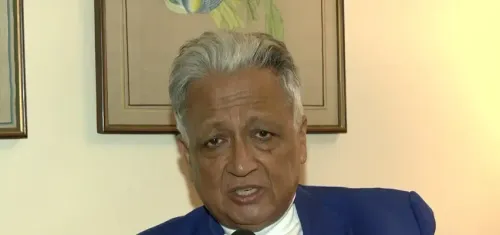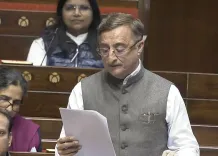Unseasonal Rain Impacts Samba Paddy in Tamil Nadu, Farmers Face Setbacks

Synopsis
Key Takeaways
- Unseasonal rainfall has severely impacted Samba paddy crops.
- Farmers have requested a higher moisture limit for harvested grains.
- The Delta districts are under inspection by a Central government team.
- Major losses reported due to heavy rains from the northeast monsoon.
- State government seeks additional funds for relief and rehabilitation.
Chennai, Jan 23 (NationPress) Farmers in Tamil Nadu’s delta region are experiencing significant losses in Samba paddy crops due to unseasonal rainfall and ongoing foggy conditions.
The regions of Mayiladuthurai, Thanjavur, Tiruvarur, and Nagapattinam, collectively known as the “rice bowl” of Tamil Nadu, have been profoundly impacted by recent heavy showers that led to flooding and water accumulation. Between September 2024 and January 17, 2025, a total of 1,349 Direct Procurement Centres (DPCs) procured 572,464 tonnes of paddy from 80,634 farmers, with ₹1,378 crore directly deposited into their bank accounts.
Despite these measures, farmers are facing hardships as unseasonal rains, overcast skies, and frost have obstructed the drying of harvested paddy, resulting in grains with elevated moisture levels. The current harvest season has been particularly tough for Samba paddy growers, who struggle to maintain the acceptable moisture threshold of 17 percent.
The unseasonal rains and foggy conditions have rendered them unable to adequately dry their crops. Consequently, the affected farmers have requested a visiting central team to raise the moisture limit from 17 percent to 22 percent.
A Central government team is presently assessing the Delta districts, including Thanjavur, Tiruvarur, Nagapattinam, Mayiladuthurai, Cuddalore, Tiruchy, Pudukkottai, Perambalur, and Ariyalur. They have toured villages such as Kakkarai, Puthur, Telungan Kudikadu, Pulavankadu, and Pappanadu near Orathanadu, examining DPCs and gathering samples for evaluation.
Farmers informed the team that vast acres of paddy have been harmed due to the intense rainfall brought on by the northeast monsoon. They also indicated facing substantial losses after taking loans at high interest rates for farming.
The state has seen a 40 percent decline in Samba paddy yield during the 2023-24 season attributed to a deficit in the northeast monsoon. Although rainfall was sufficient for the 2024-25 season, poor de-silting and drainage practices exacerbated the situation, making crops more susceptible to damage.
Tamil Nadu registered a 14 percent surplus in rainfall during the northeast monsoon, receiving 447 mm compared to the usual 393 mm. Chennai recorded 845 mm of rainfall, which is 16 percent above average, while Coimbatore experienced a 47 percent increase.
Cyclone Fengal, which hit the state from November 29 to December 1, caused extensive destruction, leading to 12 deaths and inundating 211,139 hectares of farmland. The Tamil Nadu government has classified this as a severe natural disaster, compounding farmers’ difficulties. Chief Minister M.K. Stalin has requested ₹2,000 crore in interim relief from the National Disaster Response Fund (NDRF). While the Central government has approved ₹944 crore, Tamil Nadu is seeking an additional ₹6,000 crore for relief, rehabilitation, and infrastructure restoration.










